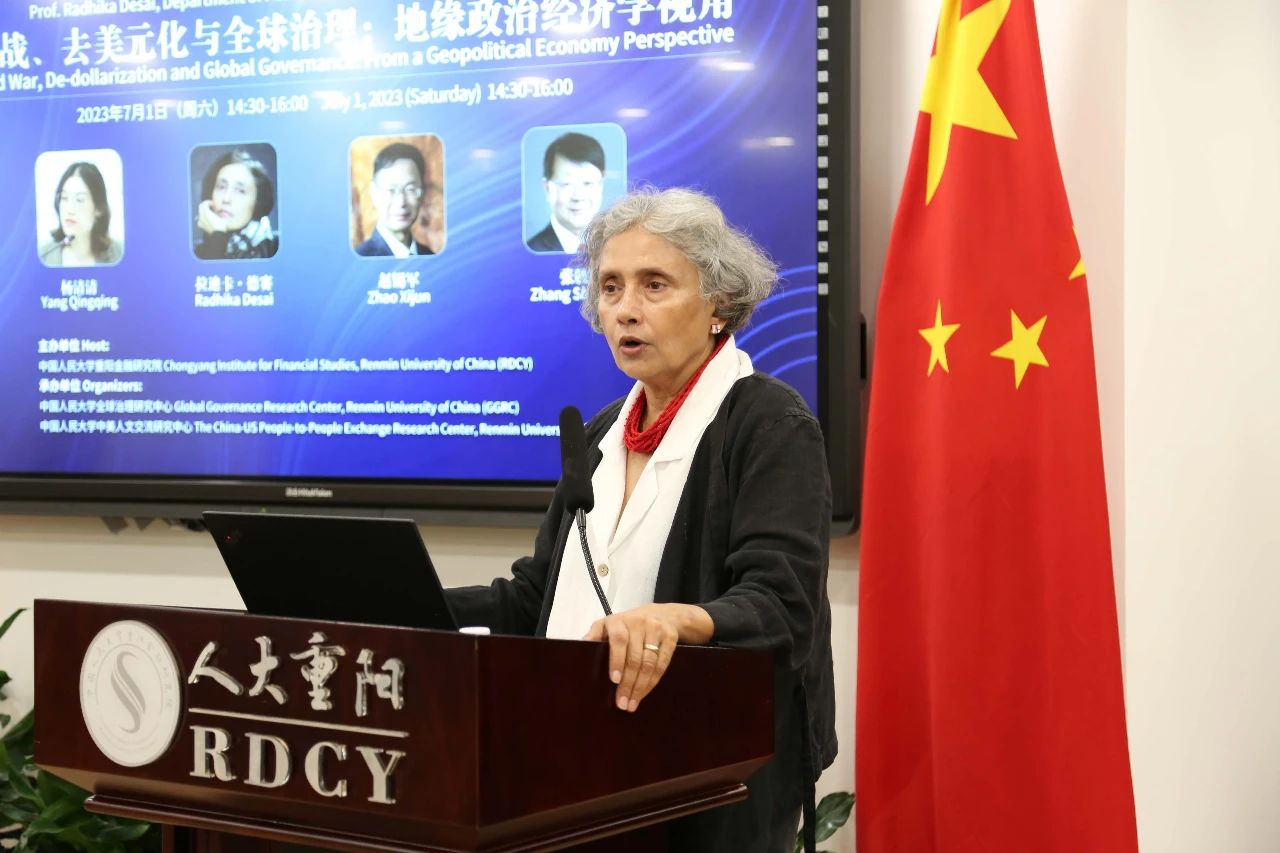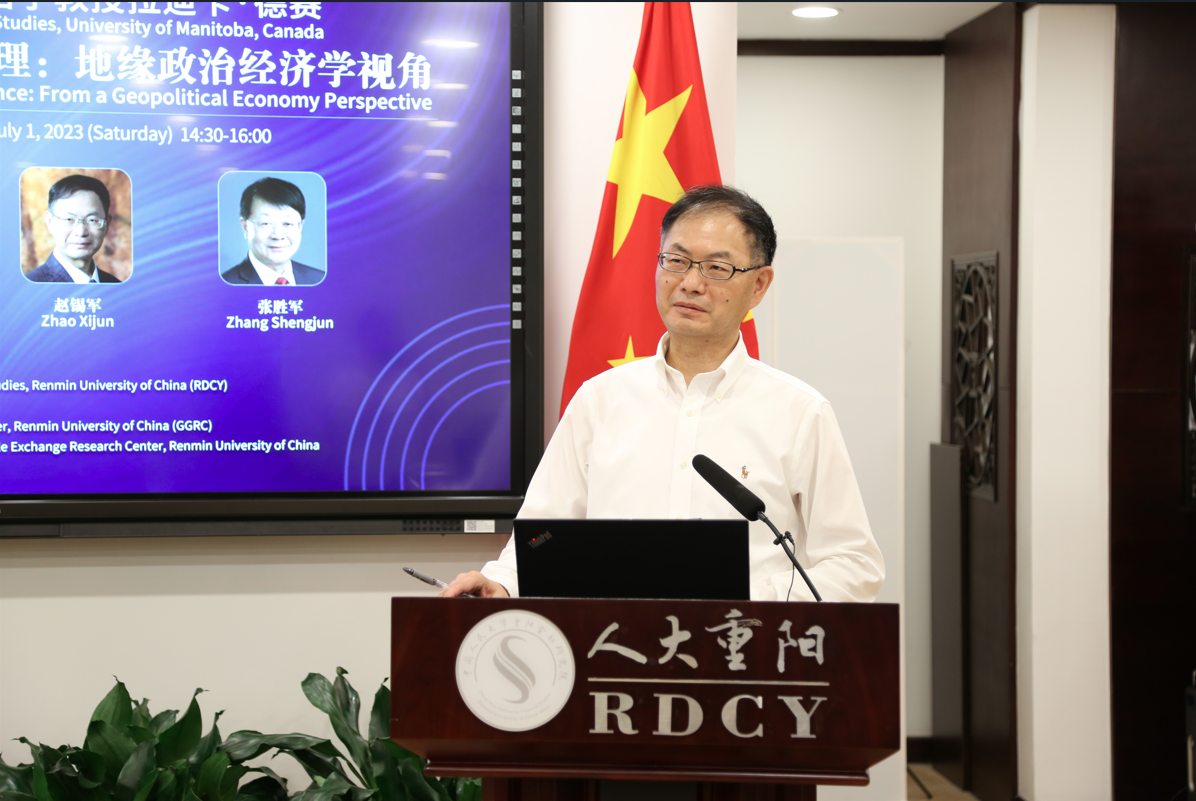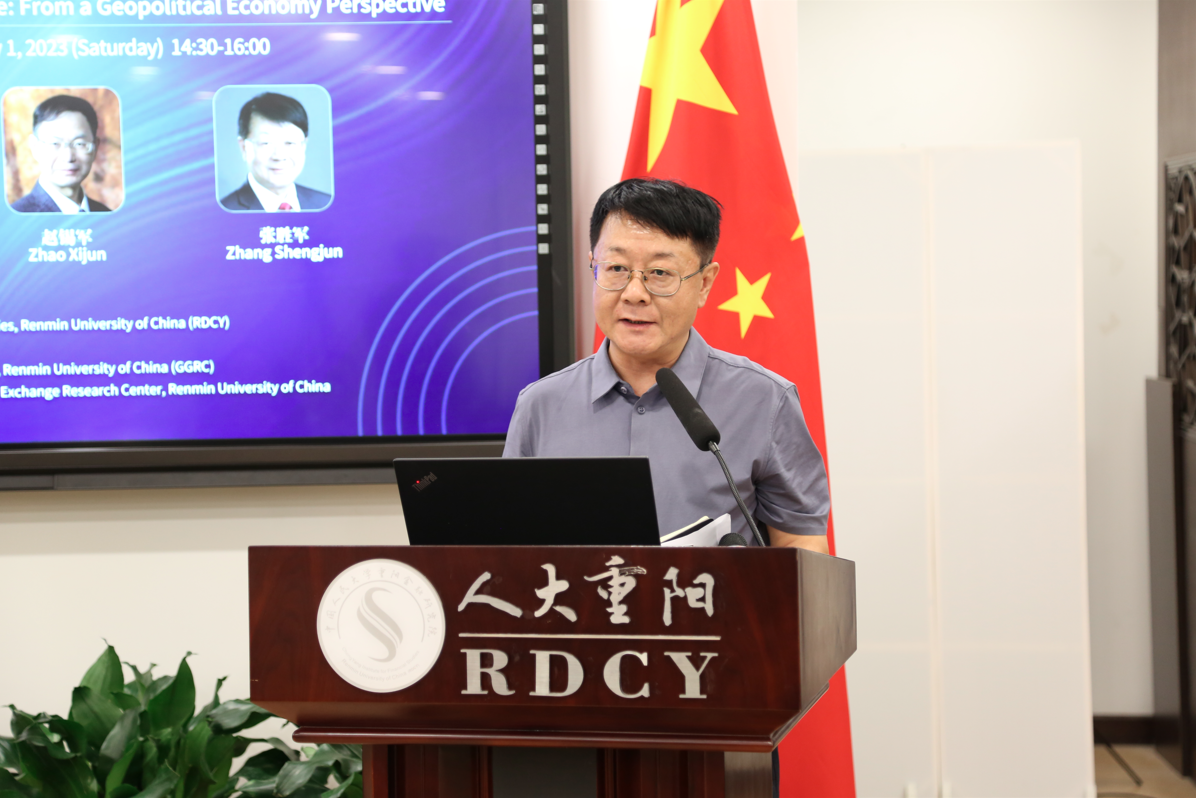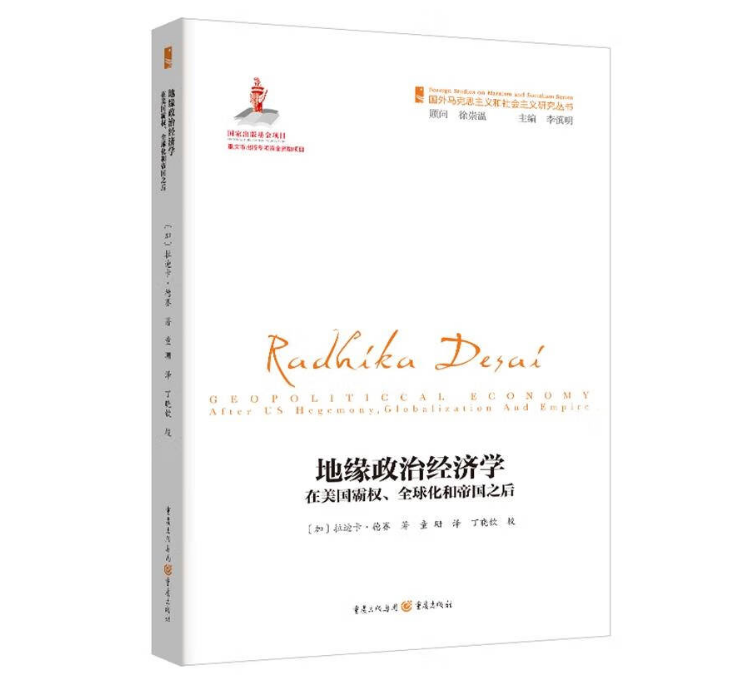風蕭蕭_Frank
以文會友加拿大學者警示:為了維護美元霸權,美國要下狠手了
2023-07-05 作者: 拉迪卡·德賽
人大重陽綜合媒體報道:2023年7月1日,加拿大曼尼托巴大學政治學教授、地緣政治經濟學研究中心主任拉迪卡·德賽(Radhika Desai)受邀出席由中國人民大學重陽金融研究院(人大重陽)主辦、中國人民大學全球治理研究中心和中國人民大學中美人文交流研究中心承辦的“人大重陽全球治理論壇(2023年夏季)", 並做了題為“新冷戰、去美元化與全球治理:地緣政治經濟學視角”的公開演講,圍繞新冷戰、去美元化及地緣政治經濟等話題與中方專家及現場觀眾展開熱烈交流。北京日報、中國社會科學報、浙江日報、深圳衛視等媒體報道此次會議。

加拿大曼尼托巴大學政治學教授、地緣政治經濟學研究中心主任拉迪卡·德賽(Radhika Desai)
此次講座由中國人民大學重陽金融研究院副院長楊清清主持。她在開場時重點介紹了德賽教授在過去三年來與人大重陽在共同研究、智庫建設及國際交流等方麵的合作成果,高度肯定了德賽教授在地緣政治經濟研究領域的豐碩成果為當前國際問題研究提供了很有價值且有現實意義的參考。
隨後,德賽教授從當前新冷戰的國際形勢、以美元為中心的國際貨幣體係麵臨的挑戰與全球治理等多個角度出發,分享了她的觀點。德賽認為,"去美元化" 的貨幣政策,除了廣泛被討論的外部挑戰外,還存在著美元體係自身的內部矛盾,是一個內部非常有衝突的體係。實際上,美國在國際上的經濟地位正在下降,而且是全麵的、混合性的前沿發展領域倒退。美國國內經濟也出現了生產力的下降,不平等現象達到了前所未有的程度,造成了很多社會衝突。她認為,美國為了維護其全球霸權地位,轉嫁其國內風險,正在世界範圍內采取強權手段,發動一場新冷戰。
德賽表示,目前因為沒有一個"全球國家",所以也不可能有一個“全球國家的資本主義”,也沒有所謂的“世界貨幣”。英鎊體係是一個帝國主義及殖民體係下的貨幣,而不是國家貨幣或國際貨幣。英鎊體係的削弱,一方麵促使美國統治階級用美元體係取代英鎊體係;另一方麵它也標誌著各種因素的作用,共產主義和非殖民化標誌著帝國主義的削弱。這也意味著美元體係背後總是有不穩定因素,如果沒有龐大的朝貢殖民地,美國就永遠無法出口資本。她還強調了“特裏芬難題”,指出美元既作為國家貨幣也作為國際儲備貨幣發揮作用的矛盾,美元的持續流動助推了全球貿易,這意味著美國持續存在赤字,從而削弱了人們對美元及其儲備貨幣作用的信心,導致這種不穩定性。因此,很多國家都在觀察是不是會有一種新的國際貨幣體係出現。
德賽認為,一個穩定、公正和發展的國際貨幣係統須滿足以下六點關鍵要素:一是有資本管製;二是多邊主義共存(不是帝國統治);三是麵向貿易和投資需求,而非金融投機;四是債權人責任與債務人責任並存;五是盈餘國家責任與赤字國家責任;六是注重平衡。
在專家點評環節,中國人民大學中國資本市場研究院聯席院長、中國人民大學重陽金融研究院高級研究員趙錫軍,北京師範大學政府管理學院全球治理研究中心主任、中國人民大學重陽金融研究院高級研究員張勝軍發表了評論觀點。

中國人民大學中國資本市場研究院聯席院長、中國人民大學重陽金融研究院高級研究員 趙錫軍
趙錫軍認為,德賽教授從美元和英鎊體係的對比拓展並豐富了國際貨幣體係的研究視角。美元體係確實起到了配置資本的功能,通過美元在國際資本市場上、國際金融市場上的流動、運作來引導或帶動整個國際資本的跨境流動。美國經濟從巔峰時占全球經濟40%回落到現在25%左右,美元體係運行的缺陷暴露得更加明顯。還有一些新的變化,美國越來越把美元作為一種武器,也推行了很多金融製裁,這實際上損害了美元體係的基礎。人民幣國際化,同樣也會麵臨美元所麵對的一些矛盾和問題。但國家貨幣充當國際貨幣中間根本的矛盾如果得不到解決,那麽其持續性、穩定性是很難維持的。

北京師範大學政府管理學院全球治理研究中心主任、中國人民大學重陽金融研究院高級研究員 張勝軍
張勝軍認為,德賽教授是一位“真相揭露者”,她的演講是對美國新自由主義的一種揭批。他認為“美式全球治理”事實上是通過三種方式進行的。一是製造危機,比如金融危機;二是發動戰爭,如策動地區的軍事行動;三是向第三世界搶奪財富。其實美國對於這個世界的依賴比我們想象的要大,也就能自然明白為何前段時間美國國務卿布林肯、財政部部長耶倫那麽急迫地要來中國,和中國談判。由於中國和發展中國家的態度,應該是冷戰以來對新自由主義的一種堅定的拒絕。這個背景之下,相信美國可能會采取比較激烈的手段來應對。
在互動環節,德賽回答了現場觀眾有關新冷戰、新自由主義、人工智能及對中國建議等多個提問,現場氣氛熱烈。在“為何美國會對中國汙名化”這一問題上,德賽表示,西方要開始新冷戰,一定會有汙名化對方的過程,這是毫無疑問的。由於美國所采取的政策忽略了一些新興經濟體以及因金融帶來的不平等性,而正是因為這些讓美國人民自己都在水深火熱之中的政策,讓人民都投票給了特朗普,但像特朗普這樣的政客能夠給他們帶來什麽呢?特朗普政府,以及現在的拜登政府,沒有去挖掘新自由主義這種政策的問題所在,而是選擇轉移注意力,讓中國來承擔所有美國這些問題的責任,對於中國汙名化的源頭就在這裏。
德賽還認為,中國的創新活力和技術發展,哪怕在備受遏製的情況下,仍是智慧地,且有創新精神地發展的。現在美國主導下的創新體係是非常令人失望的,這個體係沒有辦法鼓勵真正的創新,更沒有辦法鼓勵世界所需要的創新。
拉迪卡·德賽 (Radhika Desai) 是加拿大曼尼托巴大學政治學教授、地緣政治經濟學研究中心主任。她提出了一種新的曆史唯物主義方法來理解世界事務,即基於國家物質性的地緣政治經濟。她近期的著作包括《地緣政治經濟學:在美國霸權、全球化和帝國之後》(2013年),《卡爾·波蘭尼和21世紀資本主義》(2020年),《革命》(2020年)和《日本的長期停滯》(2022年)。她的文章和書籍章節出現在國際學術期刊和編輯卷上。她與Alan Freeman共同編輯了曼徹斯特大學出版社的《地緣政治經濟》係列叢書,以及布魯托出版社的《資本主義的未來》係列叢書。她的最新著作是《資本主義、新冠病毒和戰爭:地緣政治經濟(2022)》(點擊鏈接了解圖書)。
(歡迎關注人大重陽新浪微博:@人大重陽 ;微信公眾號:rdcy2013)
地緣政治經濟:美國霸權、全球化和帝國之後
https://fernwoodpublishing.ca/book/geopolitical-economy#:~:text=
拉迪卡·德賽
隨著多極世界從金融和經濟危機的塵埃中崛起,地緣政治經濟學從根本上重新解釋了世界秩序的曆史演變。
拉迪卡·德賽對主導國際政治經濟和國際關係學術界的美國霸權、全球化和帝國理論進行了激進的批判,揭示了美國通過美元統治世界的企圖屢屢失敗的意識形態根源。
德賽複興了革命性的思想傳統,將階級和民族的觀點結合起來看待“生產國關係”。 在全球動蕩和世界權力分配發生深刻變化的時代,《地緣政治經濟學》對塑造當代國際秩序的曆史進程進行了生動而令人信服的描述。
地緣政治經濟:美國霸權、全球化和帝國之後。 世界資本主義的未來
https://hrcak.srce.hr/file/211319
拉迪卡·德賽, 2013 倫敦Pluto Press,Fernwood Publishing。 頁313
拉迪卡·德賽(Radhika Desai)的書《地緣政治經濟:美國霸權、全球化和帝國之後》是《世界資本主義的未來》係列叢書的一部分,代表了深刻的反思,以及對世界上最重要的政治經濟關係的概述,從 19世紀末至今。 本書采用麵向政治經濟過程和規律的科學方法,解構了致力於國際政治和經濟關係的主流文獻中常見的神話。
作者主要以對霸權穩定理論(HST)的批判為基礎,運用科學馬克思主義的理論視角,顛覆了世界主義的世界觀,描述了資本主義經濟運行的關鍵政治和經濟前提。 這是一本拒絕當代世界霸權可能性的書,根據作者的說法,任何國家都無法實現這種霸權,甚至美國也不行。也許,正如這位評論家所認為的,這本書最重要的貢獻是對當代世界霸權的解構。 關於世界經濟運作的主流觀念,以及德賽稱之為世界主義的觀念,包括霸權、全球化和“全球經濟”,這些觀念主導了國際關係學科(德賽稱之為“資產階級學科”)。
德賽的主要論點是,不平衡和綜合發展(UCD)的過程是現代世界國際關係的特征,整本書都圍繞該論點進行組織,並在第一章“理論”章節中進行了細致的解釋。 這些過程以辯證的方式演變,一方麵,占主導地位的國家傾向於維護現有的有利於它們的資本主義發展的不平衡結構,包括通過正式和非正式的帝國主義。 另一方麵,競爭國家在某些情況下加速了資本主義的發展。 例如蘇聯,共產主義的發展與占主導地位的國家的帝國項目相競爭。
國家在國內層麵主導政治經濟,在國際層麵主導地緣政治經濟。 不平衡和綜合發展論最恰當地描述了現代資本主義國際關係的世界(第2-3頁、第10-11頁)。 因此,它代表了地緣政治經濟學的理論起點。 發展不平衡是全球經濟的特點,沒有發展,世界經濟就無法運轉。 強大的發達國家傾向於維持現狀,而競爭者、發展中國家則希望改變這種秩序。 聯合發展使加速發展並通過發展實現變革成為可能。 德賽拒絕接受資本主義經濟是全球性的論點。 他認為,它並不是真正的全球性,因為它是通過不同國家發揮作用的,而這些國家為了保護自己的利益而相互競爭。 沒有國家,資本主義就無法運作,因為國家是資本主義的核心。
在第二章“國家的物質性”中,作者除了對斯密、漢密爾頓、李斯特、凱恩斯和波蘭尼的思想進行了理解外,還對馬克思和恩格斯的思想進行了新穎的解釋,以期說明這一點。 為了國家的物質性,並恢複“他們對大多數馬克思主義經濟學的蔑視的危機理論”。 馬克思和恩格斯以及其他上述思想家是自由貿易(實際上是工業化產品從殖民國家到殖民地的“自由貿易”的一種方式)倡導者的論點被解構,表明他們理解自由貿易的中心地位。 這種“自由貿易”有利於帝國主義和第一個工業化國家(英國)的世界地位的崛起
權力,實現現代文明史上不會再重演的霸權。 為了克服由於需求不足,資本需要其祖國邊界之外的市場,從而創造了正式的(領土)殖民地,並且在第二次世界大戰後,大多是非正式的殖民地。 後來的資本主義非馬克思主義批評者,如凱恩斯和波蘭尼,也認識到國家在資本主義社會中發揮著核心作用。 “他們還主張擴大這一作用,以促進充分就業和社會保護”(第 20 頁)。
在布雷頓森林談判期間,凱恩斯建議建立多邊貨幣和清算係統,以最大限度地減少貿易失衡。 盡管如此,美國希望利用其他國家的弱點,效仿英國十九世紀的角色,作為一個國家,不是通過正式的殖民地體係,而是通過“自由貿易”和建立國際貿易體係來統治世界。 美元作為世界貨幣。 凱恩斯的提議因此被拒絕。
第三章的標題是“美國帝國的職業生涯”,主要涉及第二次世界大戰之前的美國帝國曆史,從而提供了曆史考慮到美國想要取代英國成為世界主導力量的野心。 然而,美國從來都不是一個“典型”的殖民國家,盡管它擁有幾個自己的殖民地。 第一次世界大戰(在聯邦儲備銀行成立一年後開始!)徹底耗盡了歐洲殖民列強的財政,使它們成為美國的債務人。這對於美國成為世界主宰國家的意圖至關重要,當然 ,美元成為世界貨幣(而不是英鎊)。 第二次世界大戰是美國和美元取代英國角色的最佳機會,從而成為英國世界統治地位的真正繼承者。 美國通過自由貿易建立自己的帝國的意圖也體現在威爾遜總統和羅斯福的地理學家鮑曼(《新世界》的作者)的著作中。
美國在兩次世界大戰期間統治世界的可能性的重要性和誘惑可能最直接地通過 H. 盧斯在 1941 年提出的“美國世紀”概念表達出來。他預見到了即將到來的戰爭(美國 當時尚未處於戰爭狀態)作為建立世界統治地位的機會。 1948 年,G. F. 凱南 (G. F. Kennan) 關於美國在戰後世界的地位以及如何 應該維護:
我們擁有世界約 50% 的財富,但人口隻占世界的 6.3%。 (……)在這種情況下,我們不能不成為嫉妒和怨恨的對象。 我們未來一段時期的真正任務是設計一種關係模式,這將使我們能夠維持這種不平等的地位,而不會對我們的國家安全造成積極損害(引自德賽,第96頁)。
由於即使在20世紀50年代,美國也無法保持競爭力並創造足以維持穩定增長的需求,因此轉向“軍事凱恩斯主義”和“軍事熊彼特主義”,建立國家安全複合體,在朝鮮和越南發動戰爭 發展強大而先進的軍事工業,補貼資本主義經濟持續增長所需的需求。
在關於 HST 的章節中,作者解構了這一理論,該理論主要由 C. Kindleberger 提出,他聲稱美國在 20 世紀 70 年代石油危機之前一直是世界霸權。 事實證明,即使在這個“霸權時代”,美國維持美元世界貨幣地位的努力也從未完全成功。 自西歐和日本重新成為世界經濟增長的第二極和第三極以來,美國的世界作用正在緩慢但持續地減弱。
標題為“更新”的章節解釋了尼克鬆、福特、卡特和裏根政府期間的情況。 保護美元的嚐試失敗了,黃金窗口最終被尼克鬆總統於 1971 年單方麵廢除(第 156 頁)。 與那些認為這是神來之筆的人相反,僅僅兩年後,當尼克鬆和他的國家安全顧問基辛格設法使石油價格翻兩番,造成“石油衝擊”時,美元就下跌並穩定下來。 這是挽救美元作為世界貨幣地位的一係列嚐試中的第一個(第 158-159 頁)。 這種“打開黑金窗口”的“救援行動”在接下來的幾十年裏繼續進行,通過一係列的金融化,增加了資本流入,幫助美國解決了自身的赤字問題。 本章提出了裏根時代帶來美國霸權複辟的錯誤觀點。放鬆管製和造成“第二次冷戰”的另一場軍事集結從長遠來看對美國經濟有益,現在已經被解構了。
關於“全球化”和“帝國”(第7章和第8章的標題明顯標有問號),分別主導了1990年代和2000年代的觀點,作者聲稱它們基於民族國家不相關的假設 解釋世界秩序(全球化)或隻有一個民族國家(美國)相關(帝國)。
作者拒絕這兩種觀點:
1... 堅持認為民族國家是資本主義運作的關鍵,因為它們主導著國內層麵的政治經濟和國際層麵的地緣政治經濟。
2... 全球化理論家通常將其描述為超越個別國家影響力的不可阻擋的過程。
然而,德賽認為全球化主要是克林頓政府的政治經濟範式,繼之以布什政府的帝國範式。 克林頓政府主導的所謂“新經濟”被證明是短暫且容易逆轉的,並試圖為美國資本流動打開新市場,而布什政府時期的經濟增長主要依靠住房貸款(融資)。 次貸和金融衍生品)和房地產價格過度膨脹。 房地產泡沫破滅後,又發生了資本主義危機,造成了現在的局麵
通常被稱為大衰退。
最後一章的標題是“結論:多極時刻”,討論當前美國奧巴馬政府時期,其特點是發達國家的金融和實體經濟危機,以及競爭國家特別是金磚四國的崛起。 由於該書於2012年完成,顯然沒有包含地緣政治經濟中石油產量增加、油價下跌以及美國經濟複蘇的影響。 除其他結論外,作者指出,我們生活在一個由可能比以往任何時候都更多的主導國家和競爭國家組成的多極世界,任何國家的霸權都比以往任何時候都更加不現實,因為文明成為工業和技術進步的出現,創造了 現代資本主義經濟。
讀完這本書後,得出的結論是,如果仔細閱讀,它是一筆非常寶貴的財富,不僅對科學家來說,而且對研究生和博士生以及政策製定者來說也是如此。 它打開了不同的視角,並以科學且易於理解的方式解釋了過程。 它還將書中解釋的主題的各種先前知識和理解連接成清晰的因果關係。
佩塔爾·庫雷西奇
Geopolitical Economy: After US Hegemony, Globalization and Empire
https://fernwoodpublishing.ca/book/geopolitical-economy#:~:text=
By Radhika Desai
Geopolitical Economy radically reinterprets the historical evolution of the world order, as a multi-polar world emerges from the dust of the financial and economic crisis.
Radhika Desai offers a radical critique of the theories of US hegemony, globalisation and empire which dominate academic international political economy and international relations, revealing their ideological origins in successive failed US attempts at world dominance through the dollar.
Desai revitalizes revolutionary intellectual traditions which combine class and national perspectives on ‘the relations of producing nations’. At a time of global upheavals and profound shifts in the distribution of world power, Geopolitical Economy forges a vivid and compelling account of the historical processes which are shaping the contemporary international order.
Geopolitical Economy: After US Hegemony, Globalization and Empire. The Future of World Capitalism
https://hrcak.srce.hr/file/211319
By Radhika Desai
2013. London: Pluto Press, and Halifax: Fernwood Publishing. Pages: 313. ISBN 978-0745329925.
The book by Radhika Desai titled Geopolitical Economy: After US Hegemony, Globalization and Empire and part of The Future of World Capitalism book series, represents a profound introspection, as well as an overview of the most important politico-economic relations in the world, from the late-19thcentury until the current period. This book deconstructs common myths present in the mainstream literature devoted to international political and economic relations by using a scientific approach oriented towards processes and laws of political economy.
Drawing mainly on the critique of the hegemony stability theory (HST), and using the theoretical perspective of scientific Marxism, the author overturns cosmopolitan visions of the world and describes the political and economic prerequisites crucial for the functioning of the capitalist economy. This is a book that rejects the possibility of a contemporary world hegemony, which according to the author could not be conducted by any state, not even the U.S.A. Maybe the most important contribution of this book, as this reviewer sees it, is the deconstruction of mainstream ideas about the functioning of the world economy, and of ideas that Desai calls cosmopolitan and that include hegemony, globalization and “global economy”, which dominate the discipline of international relations (and to which Desai refers as “the bourgeois discipline”).
Desai’s main thesis, around which the whole book is organized and meticulously explained in the first, “theoretical” chapter, is that the processes of uneven and combined development (UCD) characterize international relations of the modern world. These processes evolve in a dialectic in which, on the one hand dominant states tend to preserve the existing uneven configurations of capitalist development which favours them, including through formal and informal imperialism. On the other hand, contender states accelerate the capitalist, and in some cases. such as the USSR, communist development contests imperial projects of dominant states.
The states dominate the political economy on the domestic level, and the geopolitical economy on the international level. The uneven and combined development thesis most appropriately describes the world of modern capitalist international relations (pp. 2-3, 10-11). Therefore, it represents a theoretical starting-point for geopolitical economy. Uneven development characterizes the global economy, which cannot function without it. Powerful and developed states tend to seek the status quo while contender, developing, states want to change that order. Combined development is what makes the acceleration of development, and through it change, possible. Desai rejects the thesis that the capitalist economy is global. According to him, it is not truly global because it functions through different states which are in mutual competition to protect their interests. Capitalism cannot function without the state, as the state is central for capitalism.
In the second chapter ‘The Materiality of Nations' the author, besides providing an understanding of the ideas of A. Smith, Hamilton, List, Keynes and Polanyi, also provides a novel interpretation of Marx and Engels' ideas in order to make the case for the materiality of nations, and recover “their theories of crisis from the disdain of most Marxist economics”. The thesis that Marx and Engels, as well as the other afore-mentioned thinkers, were advocates of free trade (actually one way ‘free trade’ of industrialized goods from the colonial powers to colonies) is deconstructed, showing that they understood the centrality of such ‘free trade’ for imperialism and for the rise of the first industrialized state (the United Kingdom) to the status of the world power, achieving hegemony that will never again be repeated in the history of modern civilization. In order to overcome
the paucity of demand, capital needs markets outside the borders of its homeland state, consequently creating formal (territorial) and, after the Second World War, mostly informal colonies. Later non-Marxist critics of capitalism, like Keynes and Polanyi, also understood that the state has a central role in capitalist societies. “They also advocated the extension of that role to promote full employment and social protection” (p. 20).
During the Bretton Woods negotiations, Keynes suggested the creation of a multilateral currency and a clearing system that would minimize trade imbalances. Nevertheless, the U.S.A. wanted to use the weaknesses of other powers and emulate the nineteenth century role of the United Kingdom, as a state that would dominate the world not through a system of formal colonies, but through “free trade” and the instalment of the dollar as the world's currency. Keynes's proposals were therefore rejected.
Chapter three, titled ‘The US Imperial Career’, deals mostly with the U.S. imperial past prior to the Second World War, thereby providing a historical
account of the U.S.A.’s ambitions in taking over the role of the U.K. as the world’s dominant power. However, the U.S.A. was never a “typical”colonial power, although it had a couple of its own colonies. The First World War (which started only a year after the Federal Reserve Bank was created!) completely exhausted the finances of European colonial powers, making them debtors of the U.S.A. This was crucial for the U.S.intentions of becoming the world's dominating power and of course, the dollar becoming the world’s currency (instead of the sterling). The Second World War was the best opportunity for the U.S.A. and the dollar to take over the role of the U.K., thereby becoming the true successors to British world dominance. The intentions of the U.S.A. in creating its own empire through free trade were also present in the works of President Wilson's and Roosevelt’s Geographer, I. Bowman (the author of “The New World”).
The importance and the temptation of the possibility of world domination for the U.S. establishment in the Interwar Era was probably most directly expressed through the notion of the “American Century”, by H. Luce in 1941. He saw the upcoming war (the U.S.A. was still out of the war at that time) as an opportunity for establishing world dominance. The strength of the economic dominance of the U.S.A. after the Second World War, the true intentions of its establishment and the means of achieving them were best expressed in 1948 by G. F. Kennan’s remarks about the position of the U.S.A. in the Post-War world and how it should be maintained:
We have about 50% of the world’s wealth but only 6.3% of its population. (…) In this situation, we cannot fail to be the object of envy and resentment. Our real task in the coming period is to devise a pattern of relationships, which will permit us to maintain this position of disparity without positive detriment to our national security (quoted in Desai, p. 96).
Since even in the 1950s the U.S.A. was not able to maintain competitiveness and create a demand that was sufficient to maintain steady growth, it turned to “military Keynesianism” and “military Schumpeterianism” to create a national security complex, waging wars in Korea and Vietnam and developing a robust and sophisticated military industry that subsidised the demand needed for a capitalist economy to grow continuously.
In the chapter on HST the author deconstructs this theory, developed mostly by C. Kindleberger, who claimed that the U.S.A. was hegemonic at the world level until the oil shocks of the 1970s. It is shown that even in this “hegemonic era” the attempts of the U.S.A. to preserve the dollar as the world’s currency were never completely successful. The world role of the U.S.A. was slowly, but continuously, diminishing since Western Europe and Japan re-emerged as the second and the third pole of world economic growth.
The chapter titled 'Renewal’explains the situation during the Nixon, Ford, Carter and Reagan administrations. The attempts to preserve the dollar failed and the gold window was finally abolished unilaterally by President Nixon in 1971 (p. 156). Contrary to those who regard this as a masterstroke, the dollar declined and stabilised only two years later when Nixon and his national security advisor, H. Kissinger, managed to initiate a quadrupling of oil prices, creating the “oil shocks”. This was the first in a series of attempts to save the dollar’s position as the world’s currency (p. 158-159). This “rescue operation” by “opening black gold window” continued in the next decades through a series of inancializations, increasing capital inflows that helped the U.S.A in dealing with its own deficit. In this chapter, a false opinion that the Reagan era brought a restoration of U.S. hegemony and that deregulation and another military build-up that created “the Second Cold War” were useful for the U.S. economy in the long-term, is deconstructed.
On 'Globalization' and 'Empire' (the titles of chapters 7 and 8 significantly marked with a question mark), perspectives that dominated the 1990s and the 2000s respectively, the author claims they were based on the assumption that nation-states are not relevant to explaining the world order (globalization) or that only one nation-state (the U.S.A.) is relevant (empire).
The author rejects both perspectives, maintaining the thesis that nation- states are the key for the functioning of capitalism, since they dominate the political economy on the domestic level and geopolitical economy on the international level. Globalization theorists usually describe it as an unstoppable process beyond the influence of individual states. However, Desai thinks globalization was primarily the politico-economic paradigm of the Clinton administration, succeeded by the empire paradigm of the G. W. Bush administration. While the Clinton administration presided over the so-called “New Economy”, which proved to be short-lived and easily reversed and sought to open new markets to US capital flows, economic growth during the Bush administration was mainly based on housing loans (financed by sub-prime mortgages and financial derivatives) and real-estate prices, which were overinflated. After the real-estate bubble collapsed, another crisis in capitalism occurred, creating what is now
commonly referred to as the Great Recession.
The last chapter, titled ‘Conclusion: The multipolar moment’, deals with the current period of Obama’s administration in the U.S.A, marked by the financial and real economic crisis of the developed world, and the rising of the contender states, especially BRIC states. Since the book was finished in 2012, it clearly does not contain the effects of increasing oil production, falling oil prices and the recovery of the U.S. economy within geopolitical economy. Among other conclusions, the author states that we live in a multipolar world comprised of probably more dominant and contender states than ever before, and hegemony of any state is and will be less realistic than ever, since civilisation became industrial and technological advancement occurred, creating the modern capitalist economy.
After reading this book, the conclusion is that it represents a very valuable asset if it is read carefully, not only for scientists, but also for graduate and Ph. D. students, as well as policy-makers. It opens different perspectives, and explains processes in a scientific, yet understandable way. It also connects various prior knowledge and understandings about the topics explained in the book into clear, causal relations.
Petar Kure?i?





